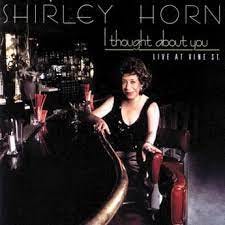She didn’t shush anyone in the bar.
Didn’t have to. Shirley Horn’s music did that for her. It sounded fragile. Small. Precarious. It sparked curiosity and maybe even concern (of the “will she be able to finish the song?” variety). It was music that thrived in bars yet was dependent on certain atmospheric conditions – one having to do with that often-futile request about keeping conversation to a minimum.
In the 1970s and early ‘80s, the pianist and singer played regularly on Sunday nights at a little tavern near Georgetown in Washington D.C. known as the One Step Down. She’d already had what many jazz people thought was her fame moment – after Miles Davis raved about her in the early ‘60s, she developed a recording career and won acclaim as a performer with a sharp dramatic sense. Then she stepped back to raise a family, leaving a gap of more than a decade in her discography.
The One Step Down residency, which I was lucky to catch regularly as a jazz-obsessed high school kid, turned out to be the beginnings of an exceptional second career: In 1987, Verve released Horn’s transfixing I Thought About You, which was recorded live at the Vine Street Bar and Grill in Hollywood. That led to a torrent of big-budget records for Verve – some thematic works, some tributes, many involving guest soloists. That, in turn, led to successful international tours and widespread acclaim.
The later records all share a key characteristic: Horn’s deceptively assured and utterly devastating sense of time. Which was best encountered and understood at slow tempos. Lots of singers can “work” a ballad for dramatic effect; Horn dared to move at a glacial crawl (or no tempo at all) in order to uncover aspects of music that can disappear in more glib, upbeat settings. She wasn’t trying to sell you something – she was bringing you step by step into another world, a realm she conjured with the infinite textures of her voice, and her clear piano chording, and oceans of open space. There was nothing capricious about this work; it was intentional and methodical in every detail, right down to the surging colors from delicately tapped cymbals.
In Horn’s music, time becomes a shared experience. It isn’t simply “there,” in the background. It unfolds. Maybe you’re listening just to keep track of the downbeats; as you do, it’s possible to hear the musicians agreeing on them, or implying other ways to think about them. Time becomes a way of accessing all the other truths embedded in the music – the stark beauty of a perfect melody told in ghost notes, the ways a simple walking rhythm can be shape-shifted and stretched in the span of a single measure. In a style of music known for its extroverted time demons, Horn remains a singular figure, the musician whose mastery is evident mostly in small gestures and silences.
Horn’s discography contains many peerless examples of this. Instead of a long playlist, I’ve selected two versions of the Jimmy Van Heusen/Johnny Mercer standard “I Thought About You” – one from the 1961 studio date Embers & Ashes and the other from the nicely recorded 1987 Verve debut. Check out not simply the slowness of these, but also the majesty of her phrasing: Here is the sound of genius unfolding, step by deliberate step.








"In Horn’s music, time becomes a shared experience. It isn’t simply “there,” in the background. It unfolds. Maybe you’re listening just to keep track of the downbeats; as you do, it’s possible to hear the musicians agreeing on them, or implying other ways to think about them. Time becomes a way of accessing all the other truths embedded in the music – the stark beauty of a perfect melody told in ghost notes, the ways a simple walking rhythm can be shape-shifted ..." The truly amazing thing about "I Though About You" is that it's not stretched out for any cheap effect but to do exactly what you are saying, "to [access] all the other truths embedded in the music. Just one kind of perfection.